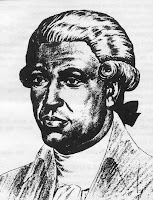 It is the story of Hidden Powers, and how two branches of the Masons faced off, and a few men and women who challenged the established order.
It is the story of Hidden Powers, and how two branches of the Masons faced off, and a few men and women who challenged the established order.African American Freemasons laid groundwork for the Civil Rights Movement of the 1950s and 1960s. This is a story in that struggle.
Freemasonry started as a stoneworker's guild in the middle ages, but by the time it arrived in America it had become a men’s club for civic leadership. By 1900 one out of three American men belonged to the Masons or another fraternal society. Millions of women joined their sister organizations. The Masonic compass and sphinx were iconic parts of everyday life, as recognizable as Apple’s bitten fruit today.
But American Freemasonry is really a tale of two secret fraternities, one white and one black.
In these characters, we find a strand linking African American Masons and the challenge to oppression and inequality, using the courts and a formidable national network to end segregation.
It started with Prince Hall, a Boston freedman and veteran of Bunker Hill, who saw Freemasonry not just as a men’s club but as a forum for transforming their future, and founded the first black Masonic lodge in the 1780s. For over a century, Prince Hall Masons grew a national network.
In October 1901 the two strands of Masonry met at the White House, represented by President Theodore Roosevelt and Booker T. Washington, over a secret dinner (soon leaked).
When Washington's conciliatory approach failed, W.E.B. Du Bois, another Prince Hall Mason, launched a more straightforward assault on inequality, and founded the NAACP. Over the next half century, black Masons and the NAACP waged a legal campaign for equality.
Hidden Powers explores this fight for civil rights before the Civil Rights era through key characters, known and unknown, from Prince Hall to Thurgood Marshall, against a national backdrop of violence and unrest. George W. Crawford, a little-known figure in the fight for equality, provides a key to the story.
Watch the video for an introduction to Crawford's story and his legacy.

No comments:
Post a Comment